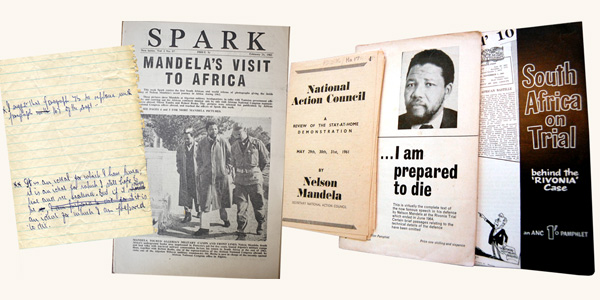Creating collective memory
- Erna van Wyk
Creating a collective memory in a country with a fragmented past and persistent inequality needs money, skills and political will to preserve its history.
The recently launched WITS-NRF Digitisation Capacity Development Initiative at Wits University is driving efforts to digitise and make available online South Africa’s vast historical collections, including a comprehensive “Mandela Archive”.
Since the early ’90s, varying materials related to former President Nelson Mandela, held in galleries, libraries, archives and museums (GLAMs) in institutions such as the Nelson Mandela Foundation or the Historical Papers Research Archive at Wits, have been collected and digitally preserved in individualised efforts to “digitise Mandela” and to make these collections available to the public to enhance a collective memory.

The next step is to bring these archives together. This goal has been set as one of the first three outcomes of the new WITS-NRF Digitisation Capacity Development Initiative: To establish a National Digital 足球竞彩app排名 Aggregator Pilot Project – a central online portal from where viewers can access South Africa’s precious collections, including the possibility of a digital “Mandela Archive”.
“Similar projects have already been done in Europe, for instance, with the Europeana Collections – a portal where thousands of GLAMs share cultural heritage for enjoyment, education and research,” says Gabriele Mohale, archivist in the Historical Papers Research Archive situated in the Willem Cullen 足球竞彩app排名 on Wits’ Braamfontein East Campus.
“It is very costly and European countries have more money. Most institutions in Africa are inhibited by their lack of funding and as such have only taken baby steps towards purposeful digitisation for access and preservation of South Africa’s rich historical heritage,” she adds.
Now, with the WITS-NRF Digitisation Capacity Development Initiative, participating institutions could combine their efforts in implementing such a pilot project between five institutions: the Historical Papers Research Archive at Wits, the Nelson Mandela Foundation, the University of Cape Town, the Desmond and Leah Tutu Legacy Foundation, and the National Archives of South Africa.
“These institutions are already applying main archival and international standards of description and it will allow us to link our institutions’ archival collections and create a multi-institutional repository, endorsed by the International Council on Archives, in a portal or aggregator where the user can put in one search term and get the output from these five participating institutions,” Mohale says.
Search: “Nelson Rolihlahla Mandela”+“Nelson Mandela”+“Mandela”+ “Madiba”
Output: *searching*
“Given South Africa’s fragmented past, archives, preservation and the digitisation of material such as the Nelson Mandela Papers here at Wits, are some of the ways to create a collective memory and enduring legacy for Madiba,” says Mohale.
Established in 1966, the Historical Papers Research Archive at Wits is one of the largest and most comprehensive independent archives in southern Africa – housing over 3 400 collections of historical, political and cultural importance, encompassing the mid-17th Century to the present.
Its Nelson Mandela Papers is a collection of records in preparation of Mandela’s two trials: the ‘State vs Nelson Mandela’ in the Pretoria Regional Court 1962, and ‘The State vs Nelson Mandela and Others’ (Rivonia Trial) in the Supreme Court (Transvaal Provincial Division) in 1963/1964.
“Digitising archives is important to not only preserve material for future generations or to create easy and open access to history, but also bring those forgotten materials back out into the current agenda. In South Africa we are historically fragmented in terms of understanding and knowledge of our histories, and digital archives play a role in accessing and enhancing memory,” Mohale says.
- Erna van Wyk is Senior Multimedia Communications Officer in Wits Communications and Digital Director of Curiosity.
- This article first appeared in Curiosity, a research magazine produced by Wits Communications and the Research Office.
- Read more in the fifth issue, themed: #Mandela100 where Wits students, academics, researchers, activists and leaders reflect on Nelson Mandela’s legacy and explore his impact over a lifetime.
